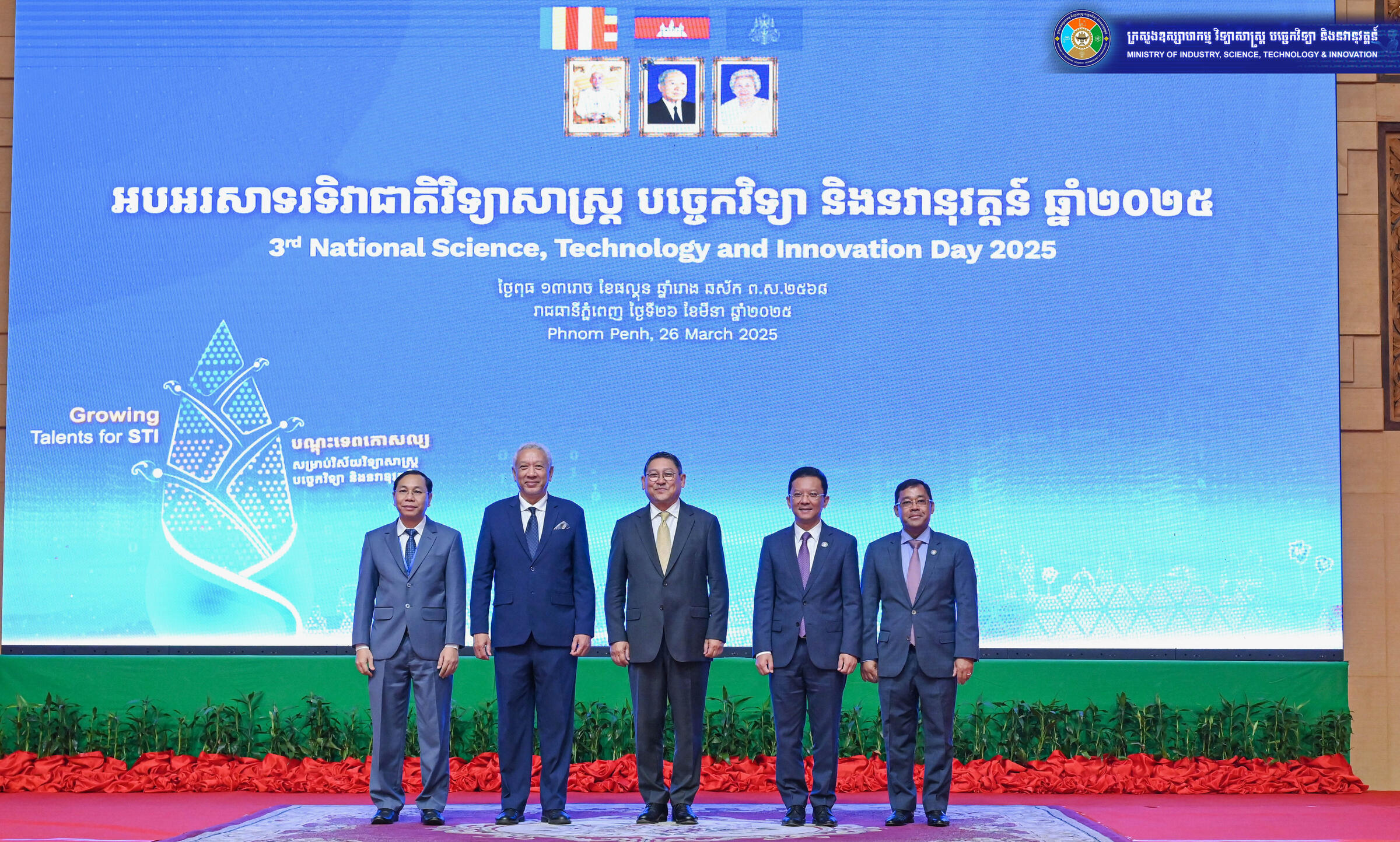
Phnom Penh, March 26, 2025 —The 3rd National Science, Technology and Innovation Day (STI Day 2025) kicked off today with the launch of four initiatives and a high-level forum on artificial intelligence (AI), focusing on nurturing talent and strengthening Cambodia’s innovation ecosystem.
Held under the theme “Growing Talents for STI”, the event brought together scientists, researchers, students, industry leaders, and development partners from across the region, including Cambodia, Malaysia, Singapore, China, Japan, Korea and the United Nations to foster collaboration and accelerate Cambodia’s shift toward a knowledge-based economy.
Deputy Prime Minister Sok Chenda Sophea, who presided over the event, reaffirmed the government’s commitment to STI development. “Science, technology, and innovation (STI) are indispensable for Cambodia’s targeted and long-term vision to become a resilient, sustainable, and inclusive high-income country by 2050,” he said. “Investing in human capital in key areas such as STEM education cannot be delayed and requires high attention.”
Minister Hem Vanndy, Chair of the National Council of Science, Technology and Innovation (NCSTI), emphasized that talented human resources are critical to building a robust STI ecosystem. He noted the central role of the NCSTI—honorarily chaired by Samdech Thipadei Prime Minister—in guiding Cambodia’s strategic direction on science, technology and innovation.
“Technology holds immense potential to drive economic growth, enhance public services, and tackle societal challenges,” Minister Vanndy said. “However, it also presents complex issues—such as infrastructure needs, ethical frameworks, and investment in human capital—that must be addressed to ensure responsible and inclusive development.”
The NCSTI is partnering with UN-ESCAP to study artificial intelligence and to formulate a national AI strategy under the “Community of Practice” cooperation. This collaboration promotes knowledge exchange and the co-creation of strategies aligned with national, regional, and global contexts.
As part of STI Day 2025, a dynamic forum titled “AI for All” focusing on inclusive and responsible AI development. A panel discussion on “Growing Talents for STI” highlighted real-world applications of frontier technologies, including AI-based diabetic retinopathy screening presented, blockchain technology integration, and cybersecurity.
In recognition of scientific excellence and public service innovation, the event also presented the Outstanding Cambodian Scientists Awards and the Public Innovation Awards, reinforcing the importance of research and citizen-led problem solving in public service delivery.
Four innovation initiatives unveiled at the event include:
1. National R&D Management System Blueprint – Developed in collaboration with the Science and Technology Policy Institute (STEPI) of South Korea, this blueprint aims to build a coherent and effective national research ecosystem.
2. Business Intelligence System (BIS) – Funded by the Japanese government under the ACMECS Framework, this digital platform supports small and medium-sized enterprises (SMEs) with real-time access to services including quotation and bidding tools, recruitment, scholarships, laboratory and calibration services, and R&D resources powered byhigh-performance computing (HPC).
3. AI-based Screening Program for Diabetic Retinopathy – A joint initiative of MISTI, the Ministry of Health, and Guizhou Center for Disease Prevention and Control, the program uses AI to detect diabetic retinopathy through analysis of fundus images, enabling early diagnosis and wide-scale screening to address the growing burden of diabetes in Cambodia.
4. Digital Travel Platform – Developed in partnership with Beijing Yiyan Technology Development Co., Ltd., the platform provides real-time updates on crowd control, and travel policies, promoting safe and smooth travel for tourists. It also offers personalized recommendations and AR-enhanced cultural insights to promote Cambodia as a smart tourism destination.
Deputy Prime Minister Sok Chenda Sophea concluded by underlining the need for collaboration, stressing that. “Science, technology, and innovation are not the sole responsibility of any single ministry; rather, they require an inter-sectoral and interconnected approach,” he said. “This necessitates close cooperation and genuine goodwill among ministries and the private sector to serve the nation’s common interests.”
By:ក្រសួងឧស្សាហកម្ម វិទ្យាសាស្ត្រ បច្ចេកវិទ្យា និងនវានុវត្តន៍